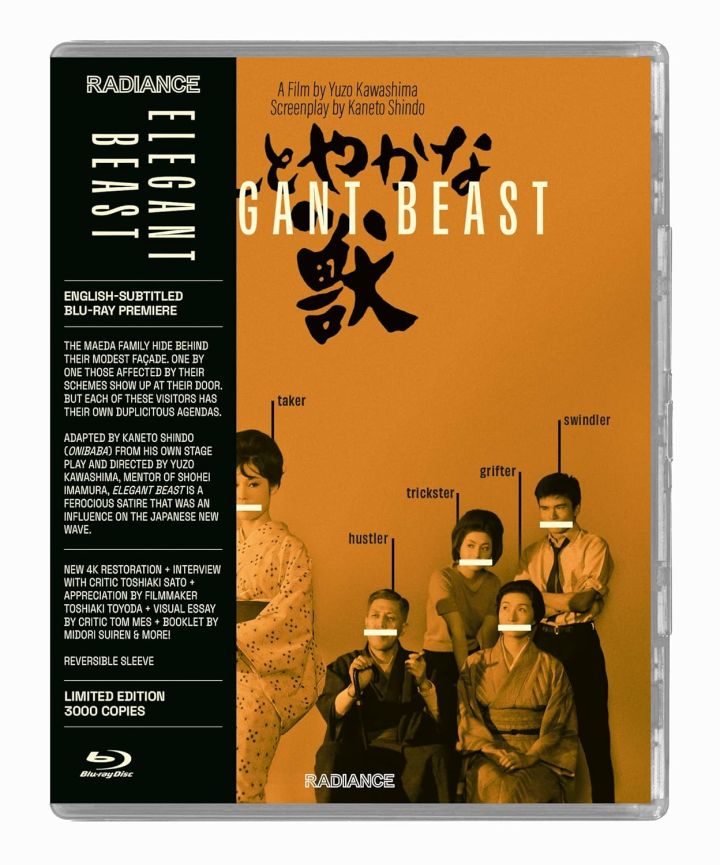
We know the Maeda family are shady from the first scene. They’re rearranging the furniture in their apartment to hide anything that looks elegant or expensive. The father, Tokizo, even puts on his son’s dingy old school robes to look poorer. They’re expecting visitors.
And the visitors come – an accountant, Yukie. A singer, Pinosaku. And Katori, an executive at a promotional company. Maeda’s son, Minoru, appears to have stolen millions of yen from Katori’s company. Minoru’s a bill collector, but he collected the bills for himself.
The Maeda’s assure the visitors that Minoru could have nothing to do with any malfeasance. They also have no idea where he is. When the visitors leave, and Minoru (who was hiding a flight up) comes in, they’re very cross with him. He’d clearly stolen plenty of money that he had not shared with his parents. That’s just being an ungrateful child.
Elegant Beast (1962) is a story about a family of thieves and grifters. Amongst themselves, they’re rather shameless about it. Daughter Tomoko has very publicly become the mistress of novelist Yoshizawa, essentially sold by her father for access to his riches. Minoru got his job through Yoshizawa’s connections. He wantonly plunders the clients of the company without concern or remorse.
Directed by Yuzo Kawashima, who will be dead six months after the film’s release, Elegant Beast is an exercise in restrained style. Part of the restraint comes from the film’s source. The screenplay by Kaneto Shindo was based on his own play. The entire film takes place in the Maeda family apartment, where they alternate between devising grifting schemes, denying those schemes to their victims, and commenting on their own shamelessness. The daughter Tomoko is dumb but sexy. Son Minoru is vindictive and nasty, almost reflexively dishonest. The parents are an interesting portrait of outward respectability. Tokizo can play obsequious host with the best of them but becomes almost instantly furious when his non-existent integrity is questioned.
What makes the story interesting is that all the victims of the Maeda’s family schemes are apparently running their own kind of scams. The novelist Yoshizawa is apparently borrowing from the Maeda’s family life to fuel his own creativity. He writes serials that are barely more than pornography. The businessman has stolen from his company himself and is paying off the tax man to cover up his own schemes.
And his accountant, Yukie, is the most devious of all. Her layers of grift, theft, and whoring that might implicate everyone (but herself) if it’s all uncovered.
What fuels everyone in this adaptation of a stage play is the terror of poverty. Yukie is a widow, with a child. She had no prospects for a legitimate future in ’60s Japan. Businessman Katori has laid all his hopes on bringing American singing sensation Evelyn Presley to Japan. He needs to appear more respectable. Even duplicitous old Tokizo has a scheme in mind: essentially, selling toilet paper to the U.S. army. Nearly 15 years after the end of the war, any semblance of economic resurgence is a house of straw, ready to crumble at the first little push.
Kawashima’s direction is very interesting. He does not “open up” the stage play. It barely escapes the apartment location, but he doesn’t film it like it’s taking place on a stage with a proscenium arch. Rather, it has several. The camera POV will move radically, and the characters might be in completely different positions than they were in the previous shot. Scenes are often shot with characters being spied on or listened in on. Everyone’s problem in the Maeda family is the other member’s entertainment. Most shots have some sort of occlusion, frames inside of frames.
Elegant Beast has a very odd tone that is hard to convey. It’s semi comic and semi dramatic. It has several scenarios that are almost funny, but the Maeda family are so matter of fact about their thievery that it disarms the outrage. The older members of the Maeda family seem entirely detached. The young entirely debauched. But then so is everyone else in this weird psycho-comic drama. It’s a satire that is brutally cynical about all aspects of post-war Japanese life.
Elegant Beast has been released on Blu-ray by Radiance. Extras include an interview with Toshiaki Sato (17 min), an interview with filmmaker Toshiaki Toyoda (14 min), and a video essay by film critic Tom Mes about Danchi, a style of public housing apartments built in Japan in the ’50s, called “The Age of Danchi” (12 min). There is also a booklet with essays about the director and the film.